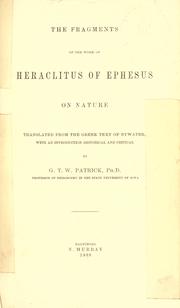

Fragment 61 famously states: “The sea is the purest and the impurest water. Heraclitus thinks that nature itself is like this. Fragment 93 says “The lord whose is the oracle at Delphoi neither utters nor hides his meaning, but shows it by a sign.” So whereas when a person says something ambiguous, you figure he means some one of the possible meanings and the ambiguity is just an epistemic matter of your having to ask him for more information, but, like the notoriously ambiguous oracle, a written sign doesn’t have intentions: it just has the multiple meanings. Several of Heraclitus’s aphorisms make use of and refer to double-meanings (in Greek, so you don’t really get this from just reading one translation). It is unwilling and willing to be called by the name of Zeus.” Fragment 32 states: “The wise is one only. His answer, strangely to our ears, is both. To Heraclitus, “listening to the logos” is about trying to suss out the underlying logic in nature, and he was (probably) the first one to try to figure out not just what the underlying element of nature is (as did his proto-physicist predecessors), but what the underlying principle of it is, and he asked the question whether this lawlike appearance of nature is something immanent within nature itself or imposed transcendentally from without. It’s about knowledge, being at the root of all the “-ology” words we have, and rationality, but not just in someone’s mind, but in nature itself. Brann’s emphasis in the book is on the Greek term “logos”-in Latin “ratio”-which has such a rich variety of meanings that she thinks we should really stop trying to translate it and just add “logos” to our lexicon. In particular, the characterization of him as a philosopher who posited that existence is pure flux (Plato’s characterization of him) seems to be bogus.ĭr.

#HERACLITUS FRAGMENTS MEANING FULL#
His book, if he even wrote a full book, did not survive antiquity, but he was quoted extensively by other authors, though in some cases (we think) erroneously. Heraclitus (who was active around 500 BCE) is the “Pre-Socratic” philosopher with probably the most influence today and together with Parmenides (it’s not clear which of the two lived first or whether they read each other) is considered the inventor of Western metaphysics. Should this “logos” be thought of as God? Does it have a personality, a will? Is it immanent in the world or a transcendent force shaping the world? Heraclitus says that the logos “is unwilling and willing to be called by the name of Zeus.” that relationships are made up of both love and strife, not in alternation but both, essentially, at the same time. Confusingly to modern readers, Heraclitus believes that paradoxes really exist, that what in this discussion we call “stable ambivalences” hold, e.g. The world is held together by tension the logos is force. The world’s intelligibility-its singular logos-doesn’t mean it’s peaceful, though. His physics imagined a basic material (he calls it fire, but clearly doesn’t mean the same thing as ordinary, visible fire) that transforms in lawlike ways (in definite ratios) into all the different parts of the world, and that it’s these cycles of transformation, driven by the logos itself, that make the world the moving system it is.

What is the world like, and how can we understand it? Heraclitus thinks that the answer to both questions is found in “the logos,” which is a Greek word with multiple meanings: it can be an explanation, a word or linguistic meaning, science, rationality (the Latin word is “ratio”), the principle of exchange between things… So the world is logos, in that it behaves in a lawlike manner so that mathematics and science can describe it. In the above podcast, Eva Brann discusses her book The Logos of Heraclitus (2011).


 0 kommentar(er)
0 kommentar(er)
